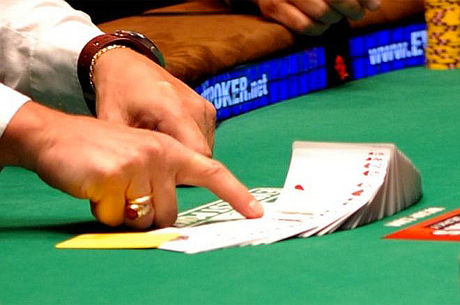Tommy Angelo Presents: Tells from the Beyond

Dear reader: I wrote this article in the beforetime, back when no one specified which kind of hold'em they played because there was only one: limit. --Tommy
I get my best reads by raising.
For instance, if I have king-queen of hearts and I make the second-nut flush, on the river, backdoor, heads-up, (with an unpaired board), and the other guy bets out, and I raise, and he reraises, and I rereraise, and he rerereraises, well, right about here I start to think he just might possibly definitely probably could conceivably for sure have the nuts, maybe.
This gift for pinpoint accuracy didn't just happen. A careful thought process guides me. For this hand, it might go like this:
- He bets out: Typically this means the guy most likely still has both of his cards.
- My raise: I love poker.
- His reraise: I saw him reraise on the river without the nuts once, last year sometime. In any case, I'm not convinced.
- My rereraise: In case he has doubts about my doubts.
- His rerereraise: Only one possibility remains; he must have misread his hand. He has the ace of hearts and the jack of diamonds, or maybe the other way around. This harkens back to something a wise player (Walt Z) once said to me: "If you are about to call a bet on the river, always try to put your opponent on a hand you can beat."
(Incidentally, when I pay off in a situation like this and I wind up staring at the nuts, I like to fudge the math so that being a dolt doesn't make me feel like a bozo. If I am 99.9 percent sure I'm beat, and the pot is laying, say, 15-to-1 on the final call, then I am really only taking about 7 percent the worst of it on that bet.)
Reading at the Table
Okay, so maybe I'm not that good at reading hands after all. That's why I needed to find another way to get a jump on things.
Everyone constantly reads people. Kids do it, grown-ups do it, heck, even dogs do it. We can't help it. The ability to read others is hardwired into us.
Like when you're a week late paying rent, and your landlord cheerfully asks if you got that new job yet. That's an easy one: he's worried. Or when a cab driver asks you about the names of side streets. That's a setup for a takedown.
Or when you've got a huge pile of chips on the table, and a friend on the rail magically appears next to you in the bathroom, nervously yammering. This means he is afraid of missing a chance to pop the "Can you lend me?" question before you finish peeing.
By keeping my sensory systems supple while at the poker table, peripheral information can be accumulated and assimilated, then utilized to categorize the tendencies of my opponents. Or I could just watch the game. But how boring! I'd rather learn of the things that players like to eat, or drink, or watch, or read, or listen to. Then use that information against them in the game. If that doesn't work, at least we'll have a nice conversation.
This is what I have learned so far:
What they watch:
- Players who admit to watching Baywatch are honest. If they raise, fold.
- Players who insist they have never seen Baywatch are able to convince themselves that they can convince you of anything. If they raise, reraise.
- Players who really never have seen Baywatch tend to be weak-tight.
What they eat:
- Players that eat prime rib with ketchup might reraise before the flop with nine-seven. If they raise on the turn, guess.
- Players that eat salads without dressing (or even before dressing), tend to be passive. Raise the steaks.
What they drink:
- Players that send back a glass of water because they didn't want the lime tend to think their top pair is a bad hand. If they call the turn, check the river.
- Coffee quaffers change gears so often that they get invited to AAMCO company parties. If they raise, stall.
What they read:
- Players that nonchalantly return to their Wall Street Journal after taking a monster bad beat are about to go on tilt. When they raise, duck.
What they listen to:
- Players that listen to The Who might reraise before the flop with nine-seven. If they're in the pot, turn up the volume.
And remember:
Never criticize someone until after you've walked a mile in his shoes. That way, you are a mile away, and you've got his shoes.

To join Tommy’s mailing list and receive updates on his upcoming third book, Painless Poker, plus random musings and advice, .









